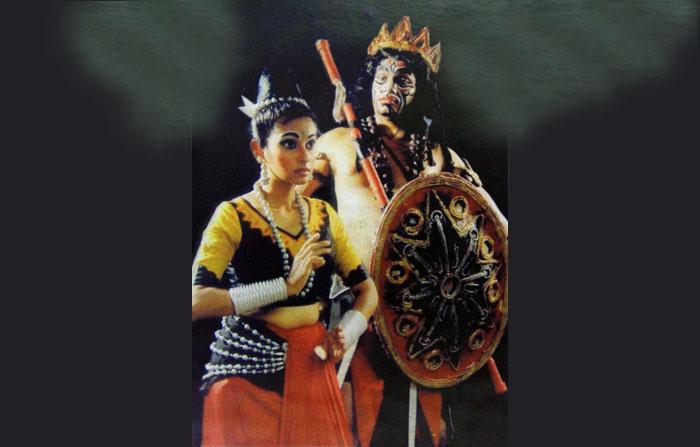
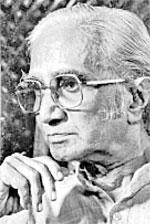 Dr. Ediriweera Sarachchandra |
“Like a compass needle that points north, a man’s (society’s) accusing finger always finds a woman. Always.” – Khaled Hosseini
She is a very independent, strong-willed woman who was misunderstood and judged. She is Princess Maname, labelled unfaithful, the one who disgraced womankind. Sixty years after its first production, the Sunday Observer took on a quest to peek into the subtleties of Dr. Ediriweera Sarachchandra’s Maname, considered the first modern drama in Sri Lanka, based on local traditions such as ‘Naadagam’ and ‘Kolam’, inspired by Chinese operas, Japanese Kabuki and Indian folk dramas.
Renowned theatre actor Nissanka Diddeniya explained that Sarachchandra didn’t share the same objective as the Jathaka Story, ‘Chulla Dhanuddhara Jathakaya’ on which the drama was based. The former declares the Princess Maname guilty and penalizes her, but Sarachchandra didn’t create black and white characters. “Sarachchandra never wanted to blame the Princess. He once said, he kept the truth in the dark, without judging who is right or wrong.”
Anura Fonseka, Project Coordinator for the Tower Hall Theatre Foundation and a former close associate of Sarachchandra said, the story is about destiny and coincidences. “The Prince and Princess, liking each other, their marriage, meeting the Veddas, the Prince’s death, Vedda abandoning the Prince, everything can be attributed to destiny or coincidences.”

(There is no need to ask me whether I like to be the wife of this Prince who is a treat for the eyes)
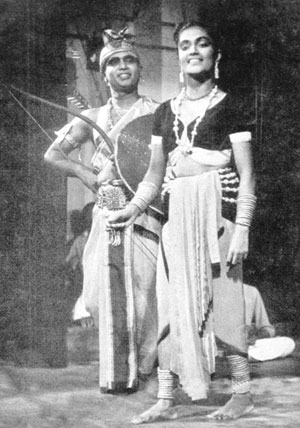
“This is a liking or love that is expressed when getting married, which grows deeper, gradually. Two independent individuals in love,” Prof. Kulathilaka Kumarasinghe, Chair Professor of the Department of Sinhala, University of Kelaniya said. The characters in the drama as well as the audience overlook her independent opinion here as she agrees with her male relatives.
![]()
(The golden voice of the Koyal birth is music to my ears, the song of flock of parrots is heavenly)
The newly wedded couple is in love, expressed when they got married, and then again in the forest, Kumarasinghe added. He aligned himself with critiques such as Sarath Amunugama and Sucharitha Gamlath who say that in the above mentioned song the Princess says, everything is pleasing to her because she is enjoying her company, because she is in love, though she doesn’t directly word it. They analysed that at this point, the Prince declares his love, and that she reciprocates.
Though in love, Diddeniya explained, it is important to understand specific characterizations of the Prince and the Princess Maname. The former is a confident warrior and the latter who had led a sheltered life throughout, is feeling exposed and vulnerable in a forest, an unknown, dangerous place. “Her entire journey is filled with insecurities.”
Then arrives the group of Veddas. And their leader expressed his desire for her immediately. Offended, Prince Maname challenges the Vedda King who stands up to the challenge and establishes his authority by stating that the forest is his kingdom and demands that the Prince leave the forest, leaving the Princess behind. Preparing for the fight, the Vedda King sends his troops away, stating that he’ll “finish off this fox” and join them.
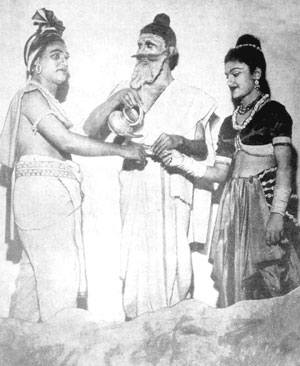
The climax of the story is where the Prince overpowers the Vedda King and asks for the sword from the Princess to kill the Vedda. But here, the Princess’ opinion doesn’t agree with her husband. She reasons:

(He fought you alone, with courage and without seeking support from his team, so, why do you want to behead him with this sword?)
This is the first time her opinion contradicts with the male opinion in the drama and the Prince is aghast to hear her. Seeking the opportunity, the Vedda King releases himself, grabs the sword and stabs the Prince.
Kumarasinghe analysed the situation, where Princess Maname didn’t give or tried to give the sword to the Vedda. She was the passive figure in this scene, when the two men fought. “The Princess analysed the situation and comes to her own conclusion that it is unfair to kill the enemy.” She represents women all over the world, who try to calm their husbands when they are angry, who try to provide an alternate response to difficult situations and who analyse critically to reach a better decision. “But the man was not used to having a woman who contradicts him, and was shocked to hear her contradiction, and the Vedda seized the opportunity.”
“One thing for certain is that Sarachchandra never wanted to blame the Princess for the Prince’s death. He has expressly said, he wanted to change the perception of women in the drama, as the Jathaka Story states that women are unfaithful. The verse that immediately followed the scene of death proves it,” Fonseka said.
![]()
(Alas this tragedy occurred, whose fault I don’t know)
Followed by this statement, Sarachchandra lets the story flow, allowing the audience to analyse the situation, Fonseka explained. However, Fonseka said, Trileeshiya Abeykoon, the first Maname Princess was spat at by men in the audience after this scene, blaming her for the Prince’s death.
Immediately afterwards, the Princess and the Vedda try to deal with the truth. She cries over the dead body of her husband and accuses the Vedda King of killing him, and the Vedda confesses that he didn’t have a choice, but to save his life. Then, he expresses his feelings for her, which she replies that in her opinion, the truth as she sees it as seen earlier in the drama:

(How can I believe these lies you are saying? I don’t have any other help or protection. My only option for certain is to die here.)
This verse encapsulates the plight of the Princess: she knows he is lying but she also knows she only has two choices, either to die, or accept the Vedda’s proposal. Sarachchandra looked at the story from a very humanitarian perspective, the limited choices available for women to survive in the patriarchal society and this perspective is presented subtly, Kumarasinghe said.
The Vedda King marvels how the Princess dismissed her love for Prince Maname and sought a Vedda instead. She responds that she wanted to prevent Prince Maname from assassinating him and her thought was to give the sword to him, therefore, she saved his life. His ego hurt, Vedda King declares that he won on his own merits, with no help from her, and leaves her.
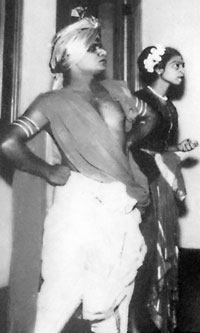 Kumarasinghe said analysing this scene, “helpless, Princess Maname tries to secure the love of the Vedda by telling him that she wanted to give the sword to him, which we, the audience know, is not true. She didn’t try to give the sword to anyone.” On the other hand, he explained that the Vedda King accuses her of trying to give the sword to her husband, clearly rejecting her opinion that damages his image as a ‘man’ in the patriarchal society. The women have become a tool in the men’s world and Sarachchandra pointed out the errors in the patriarchy that condemns independent women.
Kumarasinghe said analysing this scene, “helpless, Princess Maname tries to secure the love of the Vedda by telling him that she wanted to give the sword to him, which we, the audience know, is not true. She didn’t try to give the sword to anyone.” On the other hand, he explained that the Vedda King accuses her of trying to give the sword to her husband, clearly rejecting her opinion that damages his image as a ‘man’ in the patriarchal society. The women have become a tool in the men’s world and Sarachchandra pointed out the errors in the patriarchy that condemns independent women.
“This is not a story of betrayal. This is a story of unfortunate circumstances and Sarachchandra’s Princess Maname looks at the world in a very humanitarian way, and pays the price for voicing her opinions.”
Actor and director Kaushalya Fernando said, the story touches a sensitive point, where, as usual, the blame is put on the woman. “Men are free to express their opinions and even distort the truth, but the woman is judged for forming independent opinions.” It was a matter of survival for her, and the society, being backward, overlooks it, she added.
Manorathna said, throughout the drama, Sarachchandra tries to bring out different facets of women; her love, her kindness, her empathy, her fear. “Her plight is unfortunate and in a patriarchal society, very much a possibility.”
Unlike in the Jathaka Story where the Princess was punished at the end, Sarachchandra concludes his play with a heartfelt lamentation by the Princess before she dies of a broken heart.

(Don’t you have any sympathy for me, I don’t have any other help. Please be kind, my beloved, fine King. Why are you so stubbornly leaving me?)
Maname was a futuristic drama, that even 60 years after its production, we are yet to catch up with it. “Sarachchandra never judged women through Princess Maname. He judged the society that judged women,” Fernando said.
